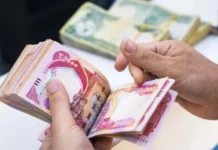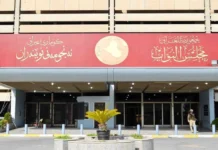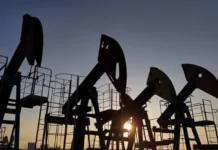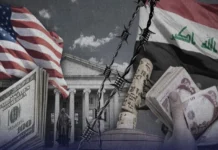Foreign Minister Warns Of Major And Dangerous Economic Repercussions
November 4, 2024 Baghdad/Al-Masala: Deputy Prime Minister, Minister of Foreign Affairs, and Chairman of the Ministerial Council for the Economy, Fuad Hussein, confirmed that the political and security situations facing the region directly affect the Iraqi economy, while he pointed out that any security tension will have major repercussions in the fluctuation of oil prices and the instability of local and global markets.
A statement by the Foreign Ministry stated that Hussein, “on Monday, November 4, 2024, chaired the thirty-third session of the Ministerial Council for the Economy, which was held in the Council building in the presence of the Deputy Prime Minister and Minister of Planning, the Ministers of Finance, Agriculture and Industry, the Secretary-General of the Council of Ministers, the Governor of the Central Bank of Iraq, the Chairman of the Securities Commission, and the Prime Minister’s advisors for economic and legal affairs. The Council also hosted the Undersecretary of the Ministry of Planning for Technical Affairs.”
The session was devoted, according to the statement, to “discussing the financial and economic reality in Iraq in light of internal and external challenges, especially regional conflicts and their impact on the Iraqi economy. The Council reviewed a presentation by the Undersecretary of the Ministry of Planning on the reality of investment projects in Iraq, whether completed or under construction, and the financial obligations associated with them.”
The Council also listened to “working papers presented by the ministers that included the main challenges facing the Iraqi economy in its financial and economic aspects. The Council discussed the rates of the state’s general revenues from oil and non-oil sources, and the rates of spending and financial obligations incurred by the government.”
The Council members presented “a presentation on the reality of the work of their ministries and agencies, and put forward proposals to maximize revenues to support the general budget, which would contribute significantly to driving the economy and development towards growth.”
The Council Chairman pointed out that “the political and security situations facing the region directly affect the Iraqi economy, and that any security tension will have major repercussions in the fluctuation of oil prices and the instability of local and global markets.”
The Council agreed to “take the necessary measures and important economic decisions that contribute to the stability of the Iraqi market after completing the discussions and exchanging opinions and working papers submitted by the Council members.” https://almasalah.com/archives/105068
IMF: Foreign Investment Outperforms Sovereign Funds In Generating Growth In Gulf
Money and business Economy News – Follow-up A study under preparation by the International Monetary Fund has found that foreign direct investment in Gulf countries has a greater impact on non-oil GDP growth than domestic investments by their sovereign wealth funds.
The study, which has not yet been published, examined private equity investments and mergers and acquisitions linked to sovereign funds in the Gulf countries, excluding the financial sector from the analysis.
The study aims to provide a model through which the amount of capital required to achieve a certain level of growth in the non-oil sectors and GDP can be estimated. According to statements made to Asharq by researchers Wenning Chen and Evgenia Koronaka, increasing foreign investment by 1% of GDP leads to an increase of more than 1% in non-hydrocarbon GDP growth over a five-year period. https://economy-news.net/content.php?id=49479
Iraq Exports More Than 6 Million Barrels Of Oil To America In A Month
Energy Economy News – Baghdad The US Energy Information Administration announced today, Tuesday, that Iraq’s oil exports to America amounted to more than 6 million barrels during last October.
The administration said in a table seen by “Al-Eqtisad News” that “Iraq exported 6 million and 161 thousand barrels of crude oil to America during the month of October, up from 5 million and 970 thousand barrels in September.”
She added that “the average exported by Iraq amounted to 241 thousand barrels per day of crude oil to America during the first week of October, while an average of 70 thousand barrels per day was exported in the second week, and an average of 237 thousand barrels per day was exported in the third week,” noting that “the exports of the fourth week amounted to an average of 216 thousand barrels per day.”
The US Energy Information Administration stated that “Iraq came in fifth place in its exports to America during the past month, after Canada, which came in first place as the largest oil exporter to America, followed by Mexico, Colombia, and Venezuela.” https://economy-news.net/content.php?id=49493
MP: Oil Derivatives Smuggling Has Decreased By 80% In Iraq
Information/Baghdad… Member of the Parliamentary Security Committee, MP Yasser Iskandar, acknowledged on Monday that the smuggling of oil derivatives has decreased by 80% in Iraq.
Iskandar said in an interview with Al-Maalouma, “The security services are adopting a comprehensive strategy in the file of ending the smuggling of oil derivatives in the country through 3 main axes, the most prominent of which is controlling the movements of tankers on the land roads between the governorates, ending the file of the breeze roads, and tightening procedures at the checkpoints.”
He added, “The smuggling of oil derivatives in Iraq has decreased by 80%, which is an important positive indicator, especially with the dismantling of a series of networks and the arrest of dozens with the tankers used in smuggling between the provinces.”
He pointed out that “the smuggling process has become more difficult in light of the ongoing security pressure and coordination between the governorates, which has yielded positive results in the past months.”
It is noteworthy that the smuggling of oil reservoirs is one of the phenomena that emerged in recent years and caused crises in several governorates. LINK
l-Sistani’s “Seven Commandments” Occupy Iraqi Politics.. A Reading Of The Position Of The Authority
Posted on 2024-11-04 by sotaliraq The statement of the highest Shiite authority in Iraq, Sayyid Ali al-Sistani, which was issued today after his meeting with Mohammed al-Hassan, the representative of the Secretary-General of the United Nations and head of its mission in Iraq (UNAMI) and the accompanying delegation, sparked various political analyses, including “returning Iraq to the square of 2004 and the constitutional revolution that he supported,” “the failure of the political experiment in Iraq,” and his warning to the government of Mohammed Shia al-Sudani, and “its inability to manage the country and the spread of weapons and chaos in the administration of the state,” in addition to warning of the possibility of the region heading towards a “major crisis.”
The head of the Center for Political Thought, Dr. Ihsan Al-Shammari, says, “Al-Sistani’s meeting with the representative of the Secretary-General of the United Nations and his talk about the humanitarian conditions in Gaza and Lebanon, as well as his warning to the Sudanese government and its inability to manage the country, the spread of weapons and the chaos of state administration, this shows that there is deep concern that will affect the region, so he is sending messages in several directions.”
Al-Shammari explained during his speech, “Among those messages are to the international community on the necessity of maintaining stability and taking into account the humanitarian aspect, and a message to the national elites who were excluded by the Coordination Framework and the Sudanese that what will happen should be taken into account, and then the national forces must work to address the upcoming crisis in the region in a way that spares Iraq its repercussions.”
For his part, political analyst Abbas Ghadir says, “It is well known that His Eminence Sayyid al-Sistani has an influence on the Iraqi and regional situation in general, and all the meetings that everyone has with al-Sistani have an impact on the Iraqi political and social situation, and al-Sistani’s meeting today with the representative of the Secretary-General of the United Nations launched a set of messages and recommendations to the Iraqi interior and exterior.”
Ghadir explains, “Al-Sistani asked the elites to benefit from past experiences and invest in them and find solutions in building the state and confining weapons. He also spoke about what is happening in the region and the Zionist aggression against the Palestinian and Lebanese peoples.”
He points out that “what was issued in this statement affected the political situation, and therefore the Coordination Framework expressed in its statement its commitment to Sistani’s directives and everything he issued, and they will be taken seriously for implementation.”
In turn, political analyst Ahmed Al-Yasiri believes that “the statement of the authority related to the new arrival of the United Nations after Plasschaert is the confirmation of the UN mission of Al-Sistani’s role that there is an important spiritual centrality that affects the joints of life in Iraq, whether on the political or social level, which is the leadership of Mr. Al-Sistani.”
Al-Yasiri added during his speech, “Also, Mr. Sistani’s statement reinforces the idea of spiritual centrality, because the events in the Middle East and the humanitarian stances launched by the authority based on its spiritual centrality have been attempted to be exploited, especially by the factions, to link them to the authority’s fatwa in 2014, i.e. militarizing the spiritual path of the authority.”
He explains that “the Iraqi factions exploited the speeches of the general authority and its spiritual centrality and attempted to militarize its discourse and invest it in its activities and security and political projects. Therefore, the authority, in its statement, lifted the cover from everyone who carries weapons and tries to find an address for this burden outside the scope of the state.”
He points out that “the authority in its statement separated its value and spiritual discourse from political investments by drawing a general vision of solutions in Iraq, which is reflected in the spiritual leadership represented by the authority supporting the centrality of the state. It is a central discourse and can be called the statement of the central authority that supports the centrality of the Iraqi state, the centrality of the spiritual authority, and also the centrality of international support.”
He explains, “Because Mr. Sistani’s statement indicated the failure of the international umbrella to contain the humanitarian situation, and that the statements put forward by the authority in the context of humanitarian aid or making room for supporting the displaced is a humanitarian path that has nothing to do with politics. Sistani also rejected foreign interventions in their general framework, or that the path of Iraqi national security should turn into a path linked to the national security of other countries.”
“This is an implicit response to some reports that the religious authority is on the list of targets, and the UN representative confirmed this meaning in his speech after leaving the meeting when he said (We condemn any process of mentioning or mentioning the name of the authority in the political or security conflicts occurring in the region) in reference to the emphasis that Sistani’s presence in Iraq is not political,” says Al-Yasiri.
He confirms that “Sistani has not received any Iraqi politician since 2015, and he is still insisting on this position, so today Sistani has returned Iraq to the square of 2004 and the constitutional revolution that he supported, and he confirmed the failure of the political experiment in Iraq and did not refer to the failure of democracy, but rather the political actors were not up to the level of responsibility, and this is what the authority has also indicated on previous occasions, but today was a confirmation of this meaning.”
The highest Shiite authority in Iraq, Sayyid Ali al-Sistani, identified seven factors for “the stability of the country,” stressing that the Iraqis have a “long path” ahead of them to achieve this.
This came according to a statement issued by his office in Najaf, after he received this morning Mohammed Al-Hassan, the representative of the Secretary-General of the United Nations and head of its mission in Iraq (UNAMI) and the accompanying delegation.
The statement explained that Al-Hassan gave Al-Sistani a brief explanation of the tasks of the international mission and the role it aims to play in the coming period.
In return, the reference Sistani welcomed the presence of the United Nations in Iraq and wished its mission success in carrying out its tasks.
Al-Sistani pointed to the major challenges facing Iraq at the present time and what its people are suffering on more than one level.
“Iraqis, especially the conscious elites, should learn from the experiences they have gone through and do their utmost to overcome their failures and work hard to achieve a better future for their country in which everyone enjoys security, stability, progress and prosperity,” said the Grand Ayatollah Sistani, stressing that “this cannot be achieved without preparing scientific and practical plans to manage the country based on the principle of competence and integrity in assuming positions of responsibility, preventing foreign interference in all its forms, enforcing the rule of law, restricting arms to the state, and combating corruption at all levels.”
Al-Sistani added: “But it seems that the Iraqis have a long way to go before they achieve this, may God help them.”
Regarding the volatile situation in the region, the reference expressed his “deep sorrow over the ongoing tragedy in Lebanon and Gaza and his deep regret over the inability of the international community and its institutions to impose effective solutions to stop it or at the very least to neutralize civilians from the tragedies of the fierce aggression practiced by the Israeli entity.” LINK






